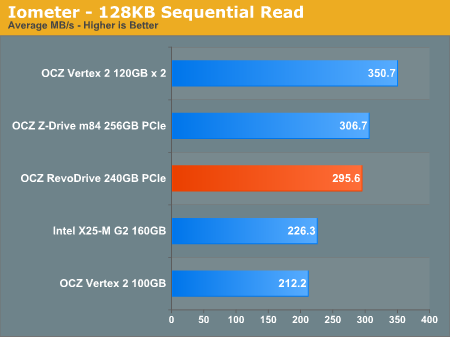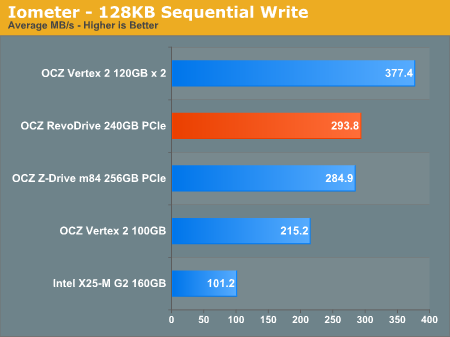OCZ's RevoDrive Preview: An Affordable PCIe SSD
by Anand Lal Shimpi on June 25, 2010 2:15 AM ESTSequential Read/Write Speed
Using the 6-22-2008 build of Iometer I ran a 3 minute long 128KB sequential test over the entire span of the drive. The results reported are in average MB/s over the entire test length. All requests are 4K aligned.

The Intel ICH10R controller actually offers better performance here by a good amount. Even the old Z-Drive m84 is a bit faster than the new Revo, perhaps due to the use of four controllers in RAID-0 on that drive.

Write performance is a similar story. The two Vertex 2s in RAID-0 are faster thanks to Intel’s highly optimized RAID controller. The RevoDrive is still no slouch and what we’ll look at next is the real world impact of these results.










62 Comments
View All Comments
MrBrownSound - Wednesday, August 25, 2010 - link
Should I be worried putting my OS on this drive? Also I have two steamy hot graphics cards, will a fan be needed?diqster - Sunday, September 26, 2010 - link
While you claim these PCIe SSDs are aimed at the enterprise market (they are), you didn't hit very many enterprise benchmarks or concerns. I'd like to see these things reviewed in any PCIe SSD review:1) Form factor. Can they fit in a half height or half length PCI slot? Putting this in tandem with spinning metal HD's in a 1U server would be ideal. Flashcache setups come to mind. The previous OCZ offerings failed miserably in this department as they're as long as some GPU cards.
2) You mentioned RAID controller, but no mention of a BBWC. A BBWC (like on the old OCZ R-Drive) would drastically speed up random writes. Enterprises are looking at flash to solve 2 problems, either random reads or random writes.
3) Enterprises don't care much about sequential I/O here. Very few things in a datacenter environment would use sequential I/O. For things like databases or key value stores, it's all random. Sure, video editing is sequential but it's neither enterprise (in most senses) nor is it very popular (number of DB's installed worldwide dwarfs number of video editors).
4) Addressing write lifetimes. Consumers can swap and replace these cards one at a time if they fail every 2 years. Doing that over installations of hundreds or thousands of these cards is rather hard. People want to know if they'll last. Again, a BBWC would help address some of these issues -- only letting the last write of 100 writes to a block go through.
If you want to be taken seriously, start reviewing stuff in an enterprise manner. As of now, these are consumer-based reviews of enterprise gear.